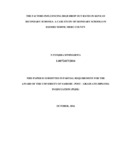| dc.description.abstract | Education is an important life process that plays a vital role in forming the foundation for a student's future better being, as it equips the learner with basic knowledge, skills and altitudes that will enable her/him to cope well in life. In Igembe North most students who attend secondary schools do not complete secondary level of education. Despite Kenya Government's commitment to subsidize students‟ education, their completion rate at secondary school level is not a hundred percent. The purpose of this study was to investigate the factors influencing high dropout rates in Kenyan secondary schools: a case study of secondary schools in Igembe North; Meru County. The specific objectives were to determine how school based factors influence the school dropout rate in secondary schools in Igembe North; Meru County, to examine the extent to which economic factors influence the school dropout rate in secondary schools in Igembe North; Meru County, to establish how family based factors influence the school dropout rate in secondary schools in Igembe North; Meru County. A descriptive survey research design was used for this study because it was useful in describing the characteristics even when analyzing multiple variables. The target population consisted of 8 Secondary Schools in Igembe north. The study population was therefore 8 principals, 64 teachers, 480 form four students. Simple random sampling was used to identify the students to participate in the study. The researcher used 30% of the teachers. The sample size for the teachers was therefore 19 teachers. Data was collected using questionnaires and interview schedules. Questionnaires were preferred because of their ability to ensure confidentiality of responses from respondents. Data was analyzed by use of statistical package for social sciences (SPSS) programmes. The raw data from the field was summarized, coded, edited and computerized through synthesizing information from the questionnaires by SPSS. majority of the respondents (students 83.3% and class teacher 86.7%) indicated that the Teachers Attitude influences whether students drop out of school or not. The study also established that households with little income are not able to retain their children in school and they prefer their children involvement in income generating activities. The study further established that Most of the teachers and the students indicated that more educated parents are more concerned of their children education and their children have high chance of being retained in school unlike less educated parents. The study concluded that Income does influence dropout among students in secondary schools. The attachment to low income is compounded by involvement in income generating activities, inability to afford basic needs, looking after young siblings and inability to pay fees. The study recommended that Poverty alleviation measures should be strengthened in the society to enable all families get higher income so as to maintain their children in school till completion. | en_US |



